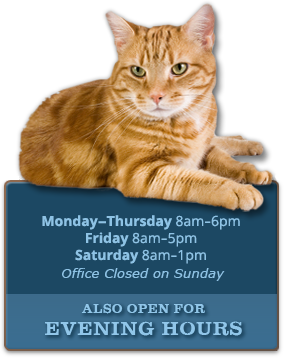The Importance of Your Pet's Wellness Exam
For millions of health-conscious Americans, the annual checkup has become a routine practice. Like people, dogs and cats can benefit from routine wellness exams too. But with one important difference—pets age faster than people.
On average, most dogs and cats reach adulthood at 2 years old. By age 4, many pets are entering middle age. And by age 7, most dogs, particularly larger breeds, are entering their senior years.
Because dogs and cats age on average seven times faster than people, significant health changes can occur in a short amount of time. And, the risks of cancer, diabetes, obesity, arthritis, heart disease, metabolic problems and other serious conditions all increase with age.

Many pet owners are not aware that taking a dog or cat to the veterinarian once a year is the same as a person seeing their doctor or dentist once every seven years. It is recommended that pets have a wellness exam every six months so that veterinarians have the opportunity to detect, treat or, ideally, prevent problems before they become life-threatening.
Prevention is the real goal of twice-a-year wellness exams. When veterinarians see a pet on a regular basis, they can help pets avoid some preventable illnesses and diseases. Plus, a pet will never have to suffer from pain that could be treated or prevented by the veterinarian.
Pet wellness exams include screenings for a variety of potential diseases. These screenings are usually accompanied by an individualized risk assessment of your pet's environment—where you live, emerging disease risks in your community, your pet's interaction with other pets and wildlife, travel plans and other lifestyle considerations.
Pet wellness exams also help your veterinarian determine a proper prevention program, including a vaccination schedule tailored specifically for your pet. By using personalized pet health protocols, veterinarians can pinpoint specific preventive health care needs for your pet.
A pet owner's best source for wellness exam and preventive health care information is their personal veterinarian. Only your veterinarian knows your pet's medical history, current health status and potential risks your pet faces.




